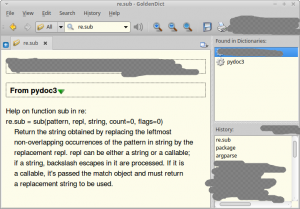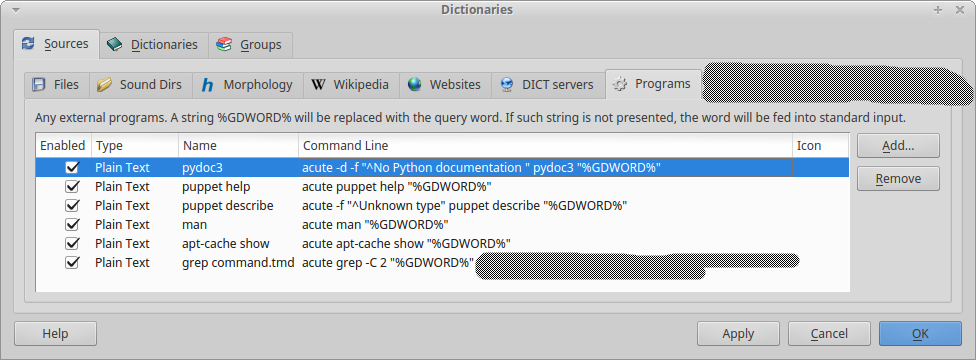 Access all documentation commands and dictionaries trough a single interface.
Access all documentation commands and dictionaries trough a single interface.
Acute(1) suppresses output if it’s just “documentation not found”, so your interface stays clean.
With GoldenDict and acute, you can see real time queries to help commands along offline programmer’s dictionaries and regular dictionaries.
By using ‘grep’ as a command, you can quickly add any one-thing-per-line as a dictionary.
Configure GoldenDict
Save acute to a text file, give execute permission and copy it to /usr/local/bin/acute. You can find acute source code at the end of the page.
$ nano acute # copy-paste, ctrl-X y enter $ chmod ugo+x acute $ sudo cp acute /usr/local/bin/acute
Add commands to GoldenDict. Here are some examples for Python 3, manual pages and Puppet.
In GoldenDict: Edit: Dictionaries: Programs
acute -d -f "^No Python documentation " pydoc3 "%GDWORD%" acute puppet help "%GDWORD%" acute -f "^Unknown type" puppet describe "%GDWORD%" acute man "%GDWORD%" acute apt-cache show "%GDWORD%" acute grep -C 2 "%GDWORD%" /home/tero/botbook-commands.txt
Acute 0.2.2 – run command, discard output if it fails
Yes, you can almost nail it in a one-liner. Almost. After edge cases, help, proper argument parsing… it’s a program.
#!/usr/bin/python3 """acute - run command, discard output if it fails Copyright 2017 Tero Karvinen http://TeroKarvinen.com GPL 3 or later Use for querying multiple external sources, without error messages cluttering output. For example, GoldenDict: Dictionaries: Programs. Examples: $Â acute -d man bash # prints manpage of bash This prints nothing: $Â acute -v --fail-string '^No Python documentation found' pydoc3 asdf This prints Python documentation for re.sub: $Â acute -v --fail-string '^No Python documentation found' pydoc3 re.sub More examples: $Â acute -d -f '^Unknown type' puppet describe file """ __copyright__ = "Copyright 2017 Tero Karvinen http://TeroKarvinen.com" __license__ = "GNU General Public License, version 3 or later" __version__ = "0.2.2" import argparse import textwrap from logging import basicConfig, info, debug, warning, error, INFO, DEBUG, WARNING import subprocess import os import sys import re def parseArgs(): parser = argparse.ArgumentParser(fromfile_prefix_chars="@", description=__doc__, epilog="acute "+__version__+"\n"+__copyright__, formatter_class=argparse.RawTextHelpFormatter) parser.add_argument("command", nargs=argparse.REMAINDER) parser.add_argument("-f", "--fail-string", help="Discard output and consider command failed if output\n" "contains FAIL_STRING. Regular expressions allowed, and \n" "it's commont to start with line start mark '^'. ") parser.add_argument("-v", "--verbose", action="store_const", dest="log_level", const=INFO, default=WARNING) parser.add_argument("-d", "--debug", action="store_const", dest="log_level", const=DEBUG) args = parser.parse_args() args.command = " ".join(args.command) if "" == args.command: parser.error("External command can't be empty.") return args def main(): args = parseArgs() logformat = "%(funcName)s():%(lineno)i: %(message)s %(levelname)s" basicConfig(level=args.log_level, format=logformat) info("Running: '%s'", args.command) (status, out) = subprocess.getstatusoutput(args.command) debug("Status: %i, Output start: %s" % (status, out[:20].replace('\n', '\\n'))) if status != os.EX_OK: info("Failed status returned by external command. Exiting...") sys.exit() if args.fail_string and re.match(args.fail_string, out): info("Fail string in command output. Exiting...") sys.exit() try: print(out) except (BrokenPipeError): info("Broken pipe caused error to acute, e.g. 'head' terminated reading of output. ") except (IOError): info("External command '%s' had IO error because of broken pipe, e.g. 'head'. ", args.command) debug("Done.") if __name__ == "__main__": main()
